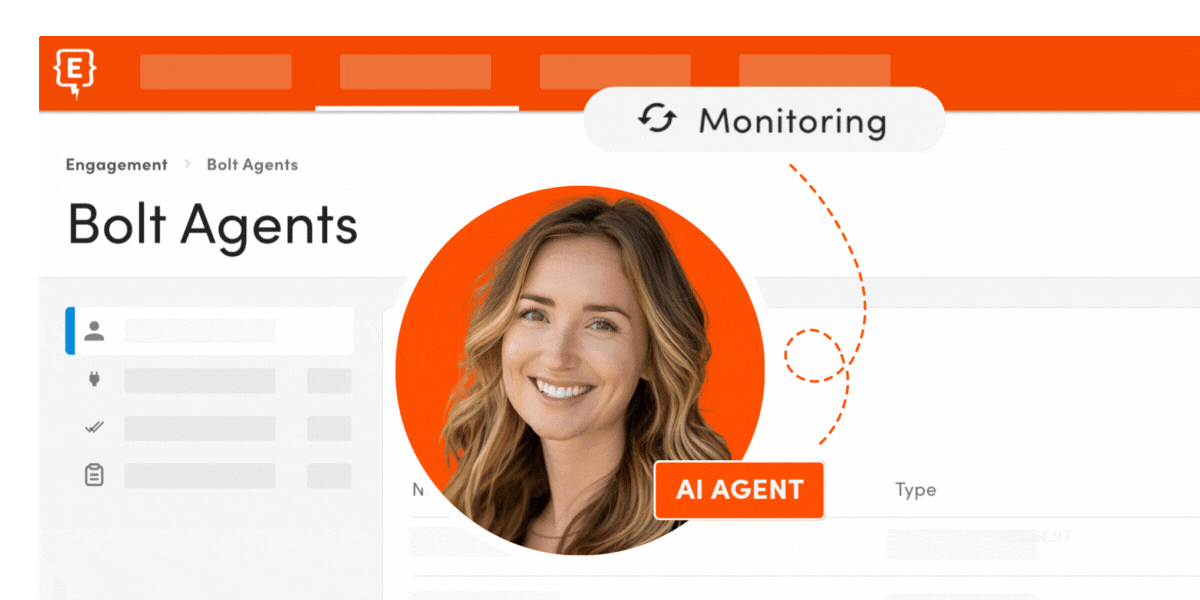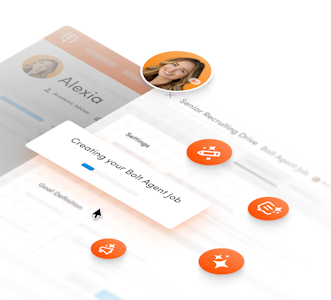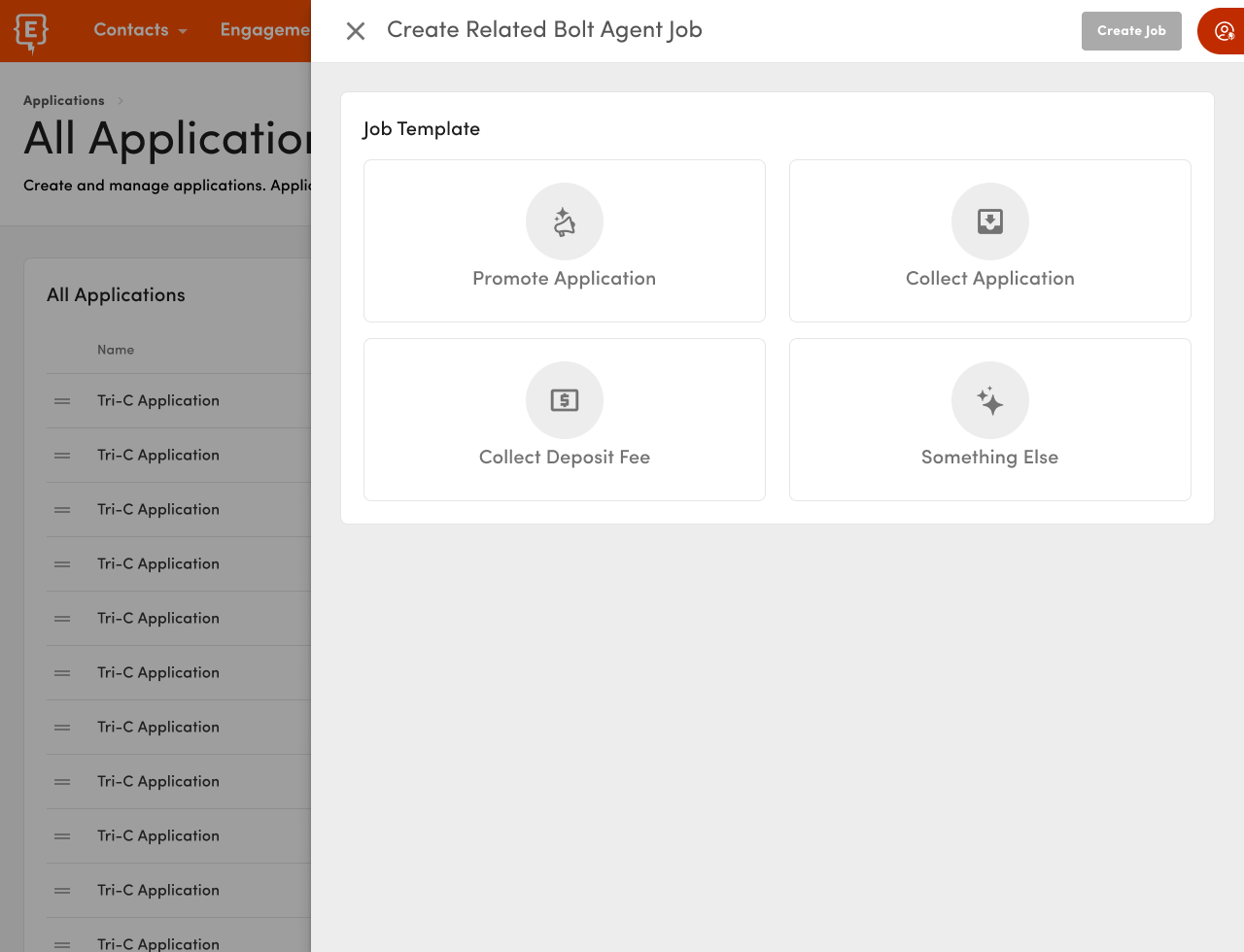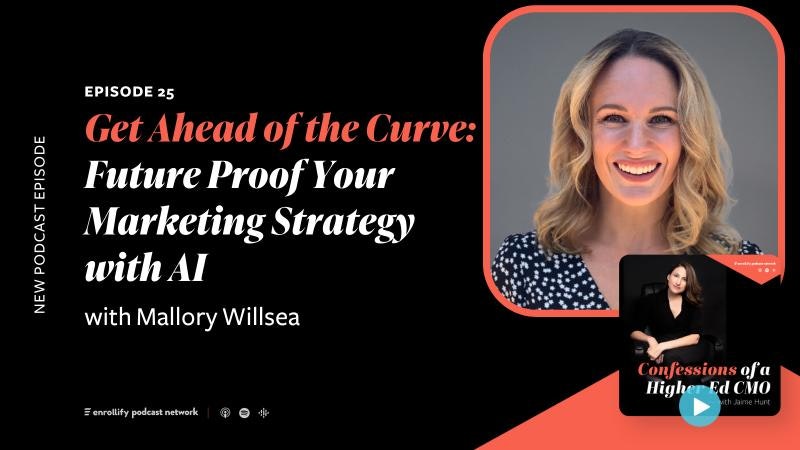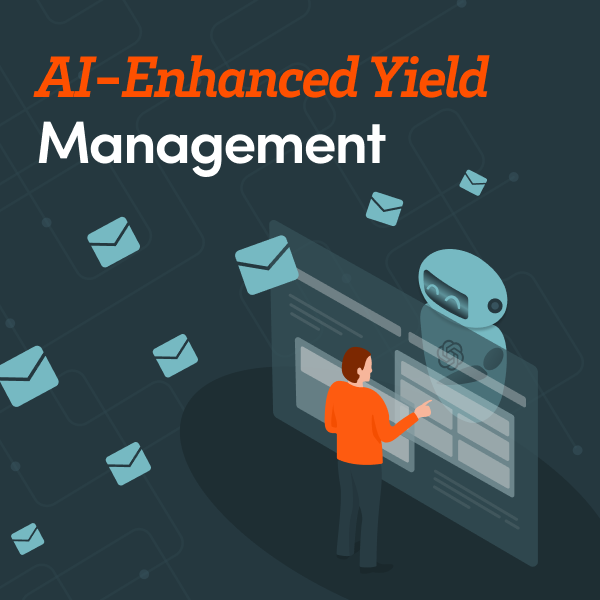Unlocking the Power of Prompt Engineering: The Secret Weapon for Higher Ed Marketers
by Rita Winthrop · Jun 01, 2023
If you haven't heard yet, having expertise in prompt engineering is crucial for higher education marketers.
In a recent episode of the Enrollify Podcast, Mallory Willsea, our vice president of marketing and demand generation, engages in a conversation with podcast host, Zach Busekrus. Together, they explore the significance of prompt engineering for higher education marketers and emphasize its potential to fuel enrollment triumph.
The Power of Personalization
Gone are the days of generic, one-size-fits-all marketing messages. In today's digital landscape, prospective students demand personalized and tailored experiences.
Prompt engineering empowers marketers to create customized prompts that resonate with individual prospects, igniting their curiosity and driving them to take action. Personalization through prompt engineering can elevate your marketing game and increase enrollment rates.
Nurturing Authentic Connections
In an era of information overload, building genuine connections with prospective students has become increasingly challenging. By crafting prompts that trigger emotional responses, higher ed marketers can forge genuine connections with their audience.
Tune in to learn the art of creating prompts that evoke curiosity, tap into emotions, and inspire prospects to explore what your institution has to offer.
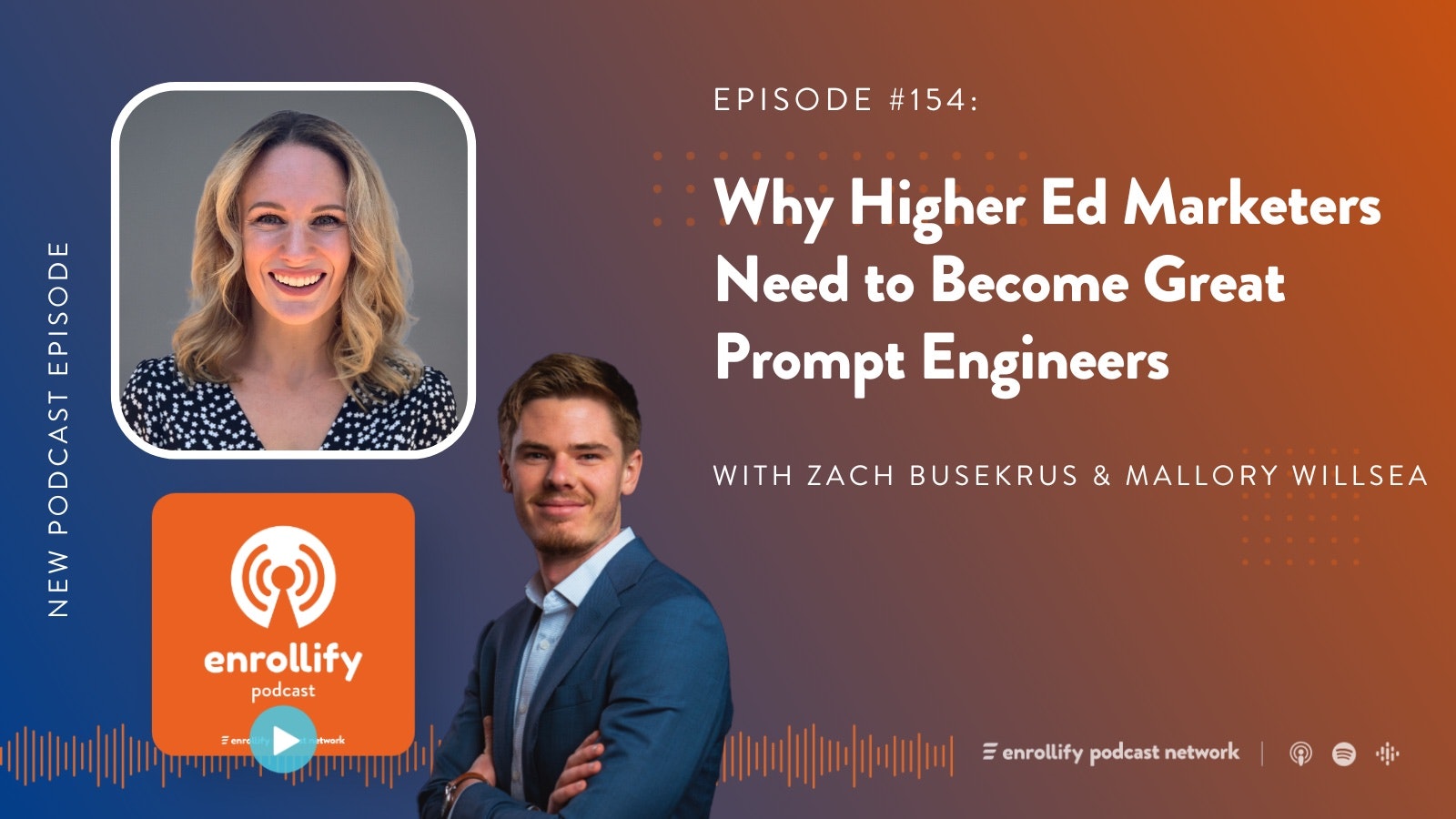
Amplifying Engagement
Engagement is at the center of successful marketing campaigns. Prompt engineering boosts your engagement strategy by creating content that is irresistibly clickable, shareable, and conversational.
From compelling headlines to thought-provoking questions, using these tactics will make your prompts stand out from the noise and captivate your target audience.
Embracing Data-Driven Decision Making
Data is the fuel that propels modern marketing forward, and prompt engineering is no exception. By leveraging data analytics and A/B testing, higher ed marketers can gain invaluable insights into what prompts resonate most with their audience. Harness the power of data to continuously optimize your prompts, ensuring your marketing efforts hit the bullseye every time.
From personalization and authentic connections to engagement and data-driven decision-making, prompt engineering has the potential to transform your marketing strategies and yield remarkable enrollment results.
Future-Proofing Your Marketing Strategy
It's time to step into the world of prompt engineering, leaving behind outdated marketing tactics.
Embrace the power of personalized prompts, forge authentic connections, amplify engagement, and make data-driven decisions.
Are you ready to rise above the competition and drive enrollment success? Listen to the podcast now.
2023 Engage Summit — Join us Virtually!
Explore the latest technologies, increase your skillset, and gain insights into today’s students, to deliver the most personalized digital engagement experience every step of the way. Even if you can't make it in person, join us virtually for this show-stopper event.
Join us in June
Full Transcript
Zach Busekrus:
Hey guys, Zach here. I want to invite you to join me at Element451’s Engage Summit on June 27th and 28th in Raleigh, North Carolina. When it comes to the student experience, we know that you want to be a trusted guide from recruiting all the way to graduation. Well, the Engage Summit brings the best minds in higher ed together to give you the strategy and tools that you need to create a cohesive student experience from start to finish, explore the latest technologies, increase your skillset, and gain insight into today's students to deliver the most powerful and personalized digital engagement experience every step of the way.
This is not your standard EdTech user conference. This is a dynamic inspiration. An empowering event for all higher ed marketers and admissions professionals. I'll be presenting at this year's event, along with some of your favorite higher ed LinkedIn and Twitter follows. You can learn more about this event and register for it at https://engage.element451.com/
Oh, and you can get $50 off your registration when you use the discount code in five 50. That's in Enroll five 50 at checkout. So go ahead, check it out. RSVP https://engage.element451.com/ Looking forward to seeing you all there.
All right, Mallory. We are, we are live. How are you doing on this fine afternoon?
Mallory Willsea:
Oh, I'm doing great, Zach. How are you today?
Zach Busekrus:
Good, good. I, now that I'm talking to you, I'm doing great. I love our conversations. We were supposed to start recording like 15 minutes ago and we've just been chatting and catching up, and so that's always fun.
I'm just ecstatic to have some time to, to chat with you, to riff on just kinda like what's happening in the world right now.
Mallory Willsea:
From the survivor finale to artificial intelligence, an edible glitter. I mean, we can talk about it all now.
Zach Busekrus:
Oh, yes. Uh, so much, so much. We have a couple things we wanna cover in particular for, for the listeners. One is just Element is hosting and incredible event in just a few weeks actually. So June 27th and 28th. I'm pumped for this event because there are a number of folks in the space that have like user conferences and I, I think one, one of the things that you guys are doing, which is really cool, is you're trying to make, engage a lot more.
It's not just an Element customer user conference, it's actually a professional development event, and you guys are really going hard on AI, and that's sort of gonna be like the, the theme that, uh, is, is the foundation of the, the topics and the content that's covered at the event, which is, which is so important.
I just wanna take a quick moment and guys, Mallory did not pay me to, to say this, but Element is doing such a great job. At helping educate higher ed right now on all things generative AI related. And there aren't enough people right now talking about this stuff and, and really sort of the, the huge implications that things like ChatGPT and, and Bard and, and so many others are going to have on all of the work that we do.
So I just wanted to start this conversation by thanking you, Mallory, and, and the team at Element for really doubling down on this because it's not happening elsewhere and, it really should be.
Mallory Willsea:
Yeah, I, well, I appreciate the props and, you know, certainly gotta give a lot of that credit to our CEO and Founder Ardis back in January when we came out of our winter holiday. We had done some really great planning going into this year and the things that we were anticipating focusing on, um, that all got turned on its head. Uh, with the release of ChatGPT at the end of last year, and both from, you know, a marketing and thought leadership perspective, but also from a product perspective for our CRM.
We completely, you know, flipped the script and said we're putting our eggs in the AI basket. Yeah. Um, it has, you know, it. Like you said, there aren't a lot of folks in our industry specifically right now who are addressing, um, the education around prompt engineering. And I have said, I've said on past and reify podcasts, uh, I've said on inside higher ed, I mean, anywhere I'm talking about this, I continue to point out that prompt engineering is the skill to learn this year.
Yeah. And anybody who is, uh, tasked with content creation, which yep. Who, who isn't tasked with content creation in some form or fashion. Um, generative AI can be a huge, huge time saver and productivity booster. And isn't that what every good higher ed leader is looking for in their teams? Yeah. So I think it's really important.
Zach Busekrus:
I couldn't agree more. And I think if you, if you have any sort of foot in any other industry, kind of like outside higher ed, You're, you're being flooded with lots of content and like there are startups left and right that are blowing up and, and, and, you know, uh, basically making huge pivots, uh, to, to sort of help respond to this, this new reality that we're all living through.
And I think it's, it's just unfortunate that there's not enough conversation happening about it in higher ed. Because I, to to the point you just made, Mallory talk about an industry that's under-resourced, right? Mm-hmm. Talk about an industry where people are. People are like, have, have been burning the candle at both ends. Is that the phrase? The candlestick at both ends, whatever the phrase is. And, and like, this is, this is not like a savior by any means, but if you can figure out how to master this well you, you are just going to have way, way, way more efficiency. And that's something that I think, uh, the industry, all of us are, are just hungry for.
Mallory Willsea:
So, yes. Um, it's, it's, it's super important that we, we take the time really, and, and I would. Just call out any leader that's listening to this conversation. And, uh, you know, one of the best gifts that you could give your team this year is to find them resources that they can tap in, tap into to become better prompt engineers.
Zach Busekrus:
And I know that Mallory, you guys are working on like a course I think right now that you're gonna launch, that's gonna help people in higher ed do this. So we can talk a little bit more about that in, in a second. But I, but I think that to just the leaders out there, if, if you. Can give your one gift to your team this year?
Mallory Willsea:
I think the gift should be finding resources that can help them better leverage these tools. Cause it's gonna make them happier. It's, it's gonna help with retention, I think, quite frankly, of, of people, your best people who are kind of burned out. It's, it's gonna do a lot of things that are, that are really, really good.
You know, Zach, let's just touch on that for a second. We're in mental health Awareness month, so this is really timely. Um, and we know that coming out of the pandemic, there's just been a massive drain of talent and resources in higher ed, which has always been historically under-resourced.
And so, um, The Huron Consulting and the Chronicle of Higher Ed actually published an article that was titled The Staffing Crisis in Higher Ed. You can find it on the Chronicles website. And in that report, uh, they said that eight in 10 higher ed leaders, um, have reported that their campuses are having more challenge.
Uh, with their open positions this year than compared to last year. Wow. And 82% of them said that their institution has had an even harder time drawing applicant applicants who meet the requirements for hiring. Huh. Um, so there, this is definitely a really important topic. There's a huge brain dump in our industry because people are leaving, they're feeling underpaid, undervalued, uh, remote work is going away.
People are forced to come back to campus. These are things that are not jiving with post pandemic realities for families. Yeah. And so when you have, you know, all of these leaders who are having trouble like the, these hiring woes exist. Um, and, and I'd recently also seen a stat that like two thirds of grad.
Enrollment leaders are considering leaving their jobs, and that was a report from this year as well. So this is like, this is why we are hitting the pavement with artificial intelligence because you have to augment the brain drain with something like you can't not do something. And this is where artificial intelligence can shine.
Yeah, you can automate, you can take those manual repetitive tasks if you need to personalize at scale. You can reverse engineer content. You can, give ChatGPT an email and have it go create content for four other channels with essentially the click of a button if you're giving it the right prompt.
Yeah. And so that's why. I am so like just beating the drum on prompt engineering, and this is why we are doing this course this summer. So the wait list is open and we are going to, um, we are going to announce, you know, the full course and, and registration for it. It'll be asynchronous learning. So it's not like you're gonna have to block off, you know, lunchtime every single Friday or something.
It'll be on your own videos and guides and geared to higher ed. So the prompts you'll be getting in the course will be completely tailored to your job. But I mean, in my opinion, like it's, it might even be less about what you're gonna be giving to your institution, but it's really about what you're giving to yourself.
Zach Busekrus:
I'm glad that you brought that up. Cause I was gonna say it, it's, it's so timely, even for your own individual professional development, like maybe you want to stay in higher ed for the rest of your life. Maybe, maybe you want to go work at, uh, higher ed adjacent company maybe wanna go elsewhere. Right. The, the, the skill mastering, prompt engineering is, is, is really, as you said, Mallory, you put it so well, the, the skill to learn this year, because it's going to be, it's going to show up in every job description. And I have friends who are in like the Bay Area, they're that are in tech and they're already, like they are.
And, and many of these, they're developers. And they're developers that are freaking out because they're like, dang, like I can't write. Like the code like ChatGPT’s code is like pretty, like, you know, it's great close to my code and yeah, it did it in seconds. Like what does this mean for my job, right?
One, one thing that I've been playing around with, That I think is maybe a very practical, um, reason why folks should care about prompt engineering. And then Mallory, you can let me know what you think of this, and then please share examples of how, how you see this happening a little bit more tangibly.
But I was playing around with Bard. It's like Google's ChatGPT. And Bard got a little bit of a rough start. Uh, I, it, they kind of re-released it and it's a lot better, at least from mm-hmm. My perspective than, than it was. And what's cool about Bard is because it's integrated with search, uh, you, you get really timely.
Uh, and because Google owns Bard, right? Like you get to, you get the wealth of knowledge, the brain that is Google syncing up with, uh, with Bard. And so what I did is like, I got a, I was working with this kind of like a consultant person, and they were talking about sort of like an SEO strategy that they wanted to put together and some, something about sort of their, the, the keywords and the topic that they wanted to target.
Just didn't, didn't really jive with me. I thought, you know what? I don't know. Like, I don't know if I believe that this, there's really, you know, enough search demand around these particular terms and topics. Normally what I would do is I'd use em Rush, which is like the SEO tool mm-hmm. That, that I use and love, but I was like, you know what?
I'm just gonna see if I can get this faster with Bard. So what I basically asked Bard to do, I was like, Hey Bard. I took his analysis, I dropped it into Bard and said, Hey, can you vet this? Let me know what you think about these terms and topics. What, here's, here's what I'm trying to do. What I'm trying to do is I'm trying to rank.
For these particular keywords, I want these specific website pages to be the pages that rank for these keywords. And I only have three months. I don't have a lot of time and I need, I need to ha, I need to like rank for these fast. What approach would you take, right? This is what a consultant gave me. What approach would you take to this strategy?
Literally in seconds. Bard gives me a it was related. There was certainly some overlap, but there were some very key differences between what Bard said my strategy should be and what this consultant strategy should be. And what Bard said is like, Hey, you could go after these particular keywords, but actually these keywords, which are very closely related, they have the monthly search volume is less, but the keyword difficulty score is significantly less.
Meaning it'll be easier for you to rank quicker. For these terms. Yeah. And these terms are close enough semantically to like what you were after originally. Let me know what you think. And I was, I was blown away. I literally sent it to every SEO that I like know. And I'm like, guys, are you playing around with this?
And, some of the SEOs were like, you know what, it's, it's not as accurate as it really should be. Of course they're like the naysayers, but I'm like, but, but directionally, they were like, this is a solid strategy. And that, that's one very specific, tangible example. So if you are working with an agency or you're, if you have any responsibility for SEO in, in your role, you can literally get the insight that emro and these [00:14:00] other expensive tools would give you simply with, with, with Bard.
And it's free. Like it is, it is crazy. It's not perfect yet, but like with a great prompt, you can get a solid s e o strategy and save yourself literally tens of thousands of dollars, you know that you'd pay to a consultant.
Mallory Willsea:
That’s my new favorite use case. I love, I love that story. It's so good. I, I've been back on Bard the last couple weeks and because you can drop a link into Bard and then ask it to do stuff with that content, right?
I am finding there are. Some use cases, and I think the one you just described as a perfect example where Bard is going to outperform ChatGPT, but I will say ChatGPT4 from a content perspective, if I'm asking it to reverse engineer or um, give me variations or idea on content. I am still finding the results to be superior.
I will give, I, I've actually been kind of a/b testing, uh, to see with the same prompt what I can get out of the two tools. And I am finding higher quality first drafts still coming out of ChatGPT, but I think you are exactly right. Anything that might require some sort of internet. Connectivity.
Yeah. We know that ChatGPT doesn't have that currently, so that's gonna be an excellent use case for Bard. And I mean, there's no reason to not flip back and forth between the two.
Zach Busekrus:
A hundred percent. A hundred percent. Yeah. And I actually think that like folks should explore with both. Cuz at the end of the day, depending on your role and your use case, like if, if, if it does help to have access to, to, you know, the powerhouse that is Google search and if you need per very, very timely information, um, I, I do think Bard, Bard is helpful there, but yeah, to your point, I, I also ask Bard to come up to write me like a few Twitter threads.
On. Um, well, I think it was like, you know, why, why more? Why? I think it was why higher ed marketers should care more about AI and the relationship between, or no, you know what it was, it was like taking an AI first approach to SEO strategy. Right? Like, Hmm. Cause a lot of people will say SEO doesn't matter anymore.
Mallory Willsea:
And I, I. Uh, maybe we're, we're getting there. At the end of the day though, a lot of this content is that these, you know, language models are using is, is still content that's coming from somewhere and I, I still think it's really important to create quality content. Also, hundreds of millions of people have used, I think like over a hundred million people have used ChatGPT already, it's still, people are still using Google search.
Zach Busekrus:
A lot, right? Like, it, like, it's not like people, it's not like the, the migration has happened, um, in any sort of like super meaningful way, right? Mm-hmm. Like it's mm-hmm. It's ChatGPT. And, and these, uh, language models have changed a lot. They're incredibly powerful, but they're not replacing search for most people.
So I, I, I dunno, I would argue, at least for right now, SEO still matters. Now that said, the way that you approach your SEO strategy has to dramatically change. It should change. Mm-hmm. So, anyways, I asked Bard to write me a thread on this, and then I asked ChatGPT to write me a thread on it and ChatGPT’s thread was way, way better, like beyond's better but beyond what Bard is.
Mallory Willsea:
I mean, is this, did we just get a preview of your Engage Summit presentation because I know you're, you are one of our feature presenters. Uh, in our industry track, and you're coming to talk to us about content marketing 3.0.
Zach Busekrus:
I'm excited for it. I, I thought like, oh, maybe I'll just have like AI do my entire presentation for me. Like what? Like what would that actually look like? And I started thinking about it and the, the, the honest reality is like, I, I enjoy, like, I like doing a lot of for myself still. And so it's like, sure, I could have, I could have chat g p d do this for me. Um, but I, I kind of like the ideating stage myself, you know? Um, so, but, but on, yes, the, the short answer is yes. Like I, I am really, I care a lot about content marketing, and I'm excited because.
I feel like the work that I've done over the last several years, uh, with podcasting and, and really thinking, really spending a lot of time diving deep into like SEO and how schools and hired marketers in particular can better leverage seo. I, I feel like I've just inherited like an army, like an army of, of really intelligent people to help me look way smarter.
And I am just excited to put this army to work and, and then, then really sort of to share these learnings about like, Hey, how do you take all the ideas that you have? For how to launch cool campaigns or how do you take all these ideas that you would normally just kind of sit you, you normally, if you were trying to brainstorm a new campaign, you'd bring your team into a room, you'd block off a few hours, you'd get out the, you know, uh, the expo markers, you'd get your whiteboard walls out, and you'd start ideating from scratch.
Mallory Willsea:
What's so cool is that a lot of the, from scratch. Can be done ahead of time. So by the time you bring people into, kinda like the war room right, to, to brainstorm that next big campaign, it, it is so much more of a productive conversation. You've saved so, so much time. And the, the, the end result is that the campaign is gonna be significantly better.
I'm looking forward to just unpacking some very specific ideas. That, that I have and that I've, you know, wrestled with, with others around what the next wave of content marketing really looks like. Like content isn't going away. AI doesn't replace the need for great content, it actually accelerates it.
Zach Busekrus:
It's just the way that you construct that content, uh, is that that's what's fundamentally gonna change. So I'm excited to talk about that. I think it, it'll be fun to just show people some use cases too, of like, Hey, you used to have to wait. Like if you're, if you're an emissions person, right? You know the pain of what it's like to ask your marketing team for like photos or images for something.
Like think about how you wanna send an email for an event and you want it to be custom. You don't wanna use this fricking same email banner that you've used a thousand times. You gotta go put in a request to marketing. Can you go get this photo for me? Can you go do this thing? Literally like now, like, like Ardis just posted something the other day about Adobe, right?
And what Adobe's doing, and that's next level. But like there are tools that will help construct these images for you. In seconds and you can dictate exactly what you want it to look like. And it will include like your university branding. So you don't even need to worry about that. You just saved yourself.
Like not if not days even. Like weeks of like, oh yeah. Waiting to get something from marketing. Right. So I think at the end of the day, it's gonna make. Admissions teams feel like they have way more marketing assets than they, than they would've got otherwise. And it's gonna help marketing teams just feel like way more efficient.
Um, and so I, yeah, I'm just, I'm just excited. I think, I think the scary part is figuring out how to get really specific and really tangible about what this actually looks like. And I'm looking forward to constructing a presentation that does that.
Mallory Willsea:
I maybe the only place that you can get this amount of content around ai. Hundred percent there. I say this whole year, but definitely this summer. Um, we can register folks in person, but also virtually.
And the virtual option is great. It's just 99 bucks and I mean, everybody in your institution can watch it. Like the more eyeballs the better. Yeah. You know? But we have. So we have you coming in talking about content marketing 3.0. Um, we have some incredible keynote and, uh, some other incredible industry folks joining us.
Allison from Sienna College Presenting. So that's going to be excellent. And then on top of that, um, we'll have sessions around integrating your data with ai, direct admissions, the rise of the chat bots, driving marketing efficiency with artificial intelligence. Um, it's, it's a stacked schedule and as someone who has been, you know, going to and presenting at and sponsoring conferences in our industry now for 10 plus years, um, and I've also been directly involved with planning some of these conferences.
I am hoping what I am able to achieve this summer is taking the best of everything I have learned over the last 10 years and just infusing it into these two days. Yeah. So there's going to be, not just, you know, it, it's, I want it to be one of those conferences where you do not feel like you sat through a dud session, um, which is hard to accomplish, but I think we are there with our schedule. So not only will the programming be top-notch, but we are going to have all of these little delightful moments. Uh, right before we started recording, um, I got to, uh, excitedly share with you that I bought on brand Edible Glitter for our happy hour. Um, so I mean, Now I think we're gonna sell out that people know that there's orange and teal glitter for their sparkling line, but we even have like dueling pianos and we've locked down the poor house in Raleigh for like a private event on Tuesday night.
So it's gonna be this fabulous balance of work and play, which I think is where the best. Right? That's what the best conferences. Operated like you go for the networking and the connections that you're going to make just as much as you go to learn something. And sometimes you walk away with just as much value in that fun bucket as you do with, you know, your pages of notes
Zach Busekrus:
Well, what I love about what you guys have done, and this is something that not enough events do in my opinion, is you've been like very curated with your, with your speakers. And again, like I, I happen to know, uh, At least half of them. Um, maybe, probably more than half personally. And these are like dynamite people.
Like these are, these are like the, like the no fluff people, right? Like, yeah, like I think about like Day and Allison, and I think about like Dan, obviously you and Ardis, but like, like these folks, like they, they just, they hate fluffy content. Like they hate, right? They, they have been in the seat being like, this presentation is a total waste of my time. Right? Like they've, yeah. It's like five minutes in. Get me outta here. Yeah. And like these, these, these folks are, are incredibly talented. Um, and love, they're, they're all just also just great speakers. Like they, they know how to engage people really well. So I, I am actually just excited to like, sit in on these sessions and, and learn and learn from Same from these folks.
So I, I'm super, super pumped about that Mallory, I do want to just give you an opportunity to talk a little bit about, I know that the course prompt engineering is very, very new, and I'm sure you guys are still kind of figuring exactly like how it's all gonna come together, but mm-hmm. Any, any specific, um, bullet points or just things that you wanna share about kind of either the goal of the course and or some of the, some of the things that folks can get excited about?
And then of course we'll have links to the pre-registration, um, in the, in the show notes below. But what, what can you, what, what sort of teaser can you give us about the course? Wow.
Mallory Willsea:
We, yeah, we've already covered that. This is a really critical skill and all the reasons why, so I'll spend a couple minutes just talking about the tangible things that people are going to learn because I guess similar to how we have approached our summit schedule, we are taking a very similar approach to this course.
We don't want it to be fluffy, we want you to actually like, have artifacts on the other side, uh, with very clear, you know, like we will pre-write some of these prompts for you and then they can serve as inspiration for others. Yeah. And you'll take what you have learned and the materials that we will provide and you'll be able to, you know, go from zero to 60 very, very quickly.
So, um, I've mentioned reverse engineering content already. That is one of my favorite. Um, Simple use cases of ChatGPT right? Taking content that you've written for a landing page or an email, and then, uh, recreating it for s m s or social posts or whatever it might be. Um, so we'll give very tangible ways to do that.
Best practices for creating personalized subject lines, and then, Beyond just some of the like very nitty gritty, like, I need you to spit out content, I'm gonna go use it somewhere else. Um, we are also going to have content around strategy, so ideation, brainstorming, um, how to adjust tone in your message based off of your audience or maybe your desired outcomes.
Or how to create a very consistent brief or, um, creative direction that is going to align to your institution's brand and messaging. So what you were saying earlier about perhaps saving tens of thousands of dollars, uh, you know, with. Your third party spending, your agencies, whatever. Um, I, I think a lot of people will have some great, uh, you know, ammo.
Yeah. Um, once they go through the course to be able to take some of the things that maybe they would have outsourced previously and actually find ways to have AI help. With that keyword, research, analyzing and interpreting data. I mean, there's just, it's like an endless place. So I think it's gonna be, actually the hard part as we're going through this is, um, honing it into, right, like what it will be like.
There's just so much that it, so much be, it's like we gotta, we have to make some choices. It's like we have to say no to something. Yeah.
Zach Busekrus:
Oh yeah. That's hard. That, that's, that's super, super exciting. I mean, I, I think it's wonderful that you guys are doing this. It's so, so, so, so needed. And again, we'll have a link in the show notes where folks can go and, and pre-register for, for this, uh, really dynamic course.
Uh, another point I wanted to make, which I maybe said before, uh, on this podcast or, or others in our network, but at the end of the day, I think what's so exciting about this moment that we're living in Mallory is. A lot of, a lot of the people that I know in higher ed who are higher ed marketers, they're, they're like marketing generalists, right?
Like, and they mm-hmm. They, they've kind of grown up, um, in the industry. Maybe they came from outside of higher ed and they, they joined, um, as, as a marketing generalist and marketing generalists are asked to do everything, like, and wear lots of different hats, right? Um, and yet like generalists are like, they're, they're really important and you have a diversified skillset, right?
That's what makes you valuable. As a, as a generalist and lo most companies, even like startups in particular that are just getting off the ground, they can't afford to hire like just the SEO gal or just like the email marketing guy. Right? Like they need somebody that can kind of do a lot of different things.
Mallory Willsea:
Mm-hmm. What's really, really cool is what these tools actually do for marketing generalists is they help them become marketing specialists, right? Because what I can do now is I have this vision and I can't tell you how many times I've worked with like a designer. And I have this very specific vision for this like conversion centric landing page that I want them to design.
And I've worked with great, great designers, but like, they're not necessarily marketers, right? Like the, some of the best designers are not marketers, right? They're designing a beautiful page, but it's like, no, but you don't understand. I need the fricking form above the fold and like I don't need all these options and all this distraction, right?
Yeah. Yeah. And what's so cool now is a lot of these tools, like they enable me. Right in, in, in many ways to become a designer, right? Yeah. And to do that at scale and like that is what is so exciting. It's like the marketing generalist in you. Like if you identify as a marketing generalist and you, you know what looks good, but you have no technical skillset in like the, you know, creative cloud, all of a sudden you have the, you have, uh, an army again of robots that can help you become a designer.
That is what's crazy. Mm-hmm. And, and you can iterate and rather than you know, sending a laundry list of like edits back to your design team or back to your SEO strategist, whoever it is that you're working with. You can literally in second say, no, I don't like that. Uh, change the color here to this and it, the, these tools, new ones are popping up literally every day.
And what's so exciting is marketing generalists, again, are gonna be able to have very, uh, diversified, more diversified skills than ever before. And the refinement of those skills, Are is going to be greater than ever before because of how fast these tools are evolving. So I just get excited because like people like you and me and others, like, who have great ideas, uh, or you know, have ideas that we think are great, we're gonna be able to execute so much faster and so much more quickly than ever before.
Mallory Willsea:
Thats the point. Uh, the execution speed of execution is going to dramatically go up. And I saw a report actually just this morning, I can't remember where it was from. Sorry, but it was basically saying that the cost per student, uh, the marketing cost per student over the last, I believe maybe 10 years or so, has just continued to rise.
And I think it's specifically said most institutions right now are paying somewhere between 450 and 650. For a student, uh, and that the amount of advertising spend in the industry, and this was a number from 2018, was 2 billion. So you gotta know what's higher than that now. Right? So when we think about that and we think back to the conversation where, where we started this podcast around.
An under-resourced industry, uh, the brain drain that's existing. And now we layer in these data points of the rising costs to enroll a student like we have just paved the road for artificial intelligence helping us execute faster because if I can get. Better messages at the right time to the right student, um, in the right medium.
Yeah. Uh, and I can do that a lot faster than my competition. I. Then I'm gonna win. Right? Yeah. Like then my school isn't going to be on the list of ones that have closed. Yeah. This year. And that could, I mean, it could save institutions from shuttering.
Zach Busekrus:
It could Full stop. Full stop. Yeah. Not take, yeah. Uh, well, Mallory, this is, this is great. I'm just so thankful for the work that you guys are doing and the content that you guys are putting out that's really helping me learn, helping the industry learn. It's super, super valuable. And I know as somebody who spends a lot of time creating content myself, I know how hard it is and how time consuming it is, even with these great tools like it, it is, it's difficult.
You know, I appreciate you guys, uh, making this a priority cause I, I really do think that to your point, this is going to be a game changer for the industry. It's gonna be very helpful. The folks that take the time to figure out how to do this stuff well, they're gonna see incredible dividends and, and really at the end of the day, you just have to decide, Hey, I'm gonna do the work and I'm gonna learn this stuff.
Yeah. And what you do, and once you get into it, I was literally showing Bard to my 72 year old father-in-law, who's a video producer, he's from Ecuador. And he, you know, English is his second language and he does these scripts, right? Um, he's retired now, but he does a bunch of like, projects for people for free.
And one of his hardest part, like the, the thing he spends the most time on is like coming up with a script and then figuring out how to say it well in English and all this stuff. I literally like showed him how to write some prompts to help write these scripts for him. He has been. A Bard user, like, you know, uh, pro user over the last few days.
He's sending me like photos and screenshots of the prompts he's using. He literally feels like his life has been changed because for the very first time, he can tell Bard in his native language too, like how he wants this to go. And Bard will write him a 15 minute script about this video that he's just produced for, for, you know, a friend of his or whatever it is.
Zach Busekrus:
And that is powerful. Like this, this guy, this guy who's never been able to do this, can do this in seconds. Mm-hmm. And he just feels like it's like Christmas, right? Mm-hmm. Um, and so anyways, if, if my, if my 72 year old father-in-law can do this and, and can figure this out, right? You can too. Like, you can, you can make this work.
Mallory Willsea:
Yeah, exactly. My, my dairy farmer, maple producing father who never really has used a computer in his life, he and I sat down a couple weekends ago and I showed him ChatGPT, and he's a contrarian by nature, so he was, you know, finding every shot he could fire at it. Dad, let's slash ChatGPT. That one, you know, it was, I, I think I blew his mind with, with this. Right. And actually there is a whole point to be made here, Zach, for people or countries or, um, anyone, institutions that maybe didn't, uh, get on board with some of the technology shifts of the last decade.
Zach Busekrus:
Very well said. Very well said. Um, well this has been great, Mallory. I really appreciate your time. As I mentioned before, folks listening and we'll have links, uh, all, all the fun links to the Engage Summit. We'll have links to the wait list for the prompt engineering course you can expect, later this summer from, from Element and the team. And then of course, we'll have links to all of Element socials. I do recommend just following Mallory, following Ardis, following, Dan and, and others on social, just to, it's a super easy way to like, get just a little bit of value in your feed and they're constantly posting new stuff. Um, I'm learning again from it as well. So just, it, it, it's a very easy follow. Uh, you'll, you'll thank me later, but appreciate your time Mallory. Thanks for, thanks for making time to chat with us.
Mallory Willsea:
Thanks, Zach. I can't wait to see you in real life next month
Zach Busekrus:
I know it's coming soon. Coming too soon.
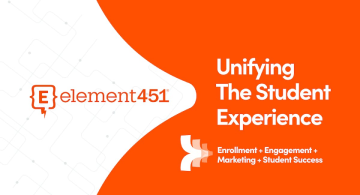
About Element451
Boost enrollment, improve engagement, and support students with an AI-driven CRM and agent platform built for higher ed. Element451 makes personalization scalable and success repeatable.
Categories
New Blog Posts
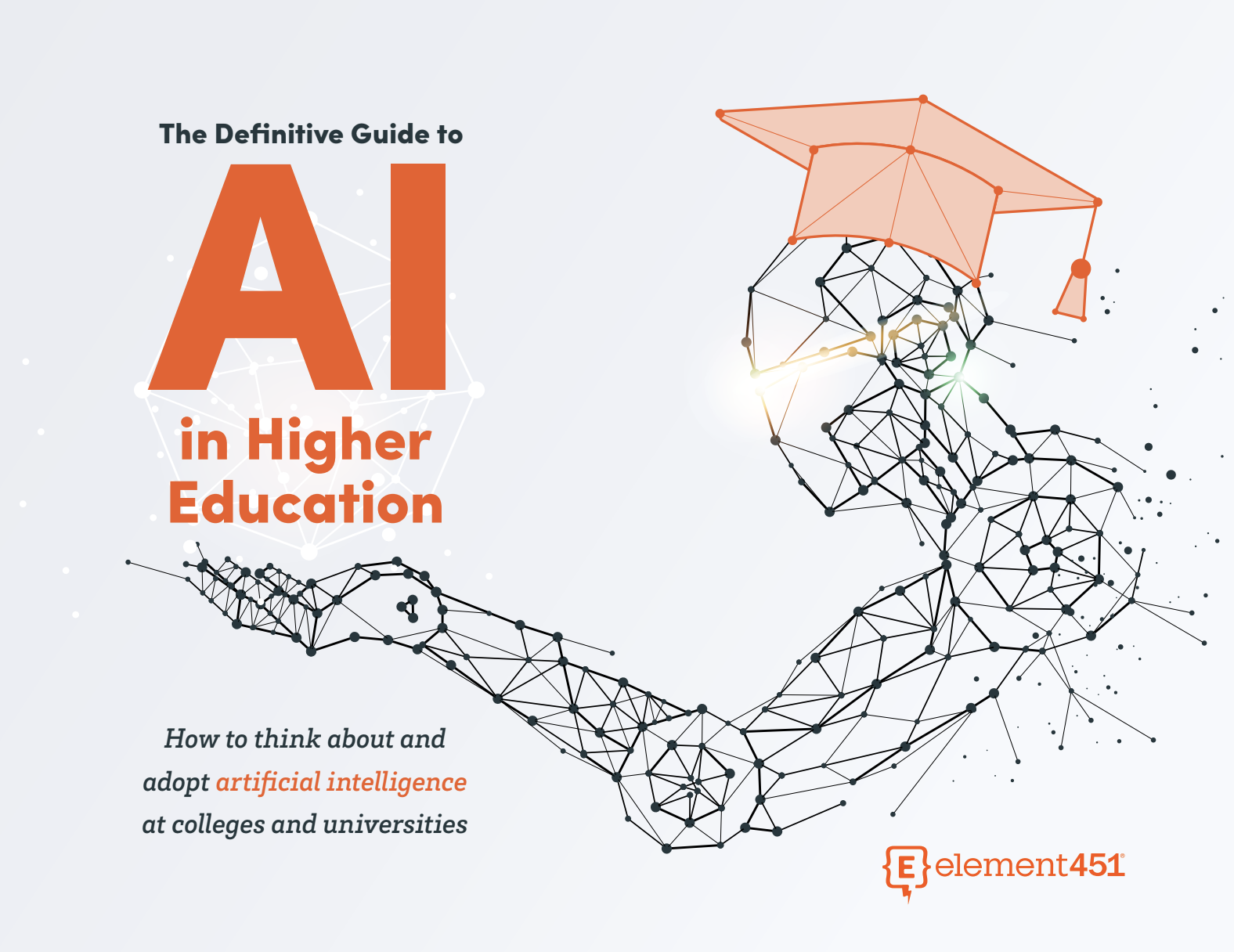
The Definitive Guide
AI in Higher Education
Bridge the gap between the latest tech advancements and your institution's success.
Useful Links
Related Articles

Talk With Us
Element451 is an AI-driven CRM and AI agent platform for higher education. Our friendly experts are here to help you explore how Element451 can improve outcomes for your school and students.
Get a Demo


